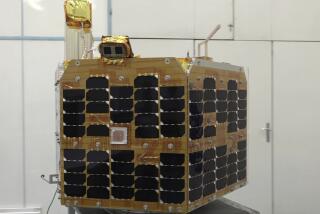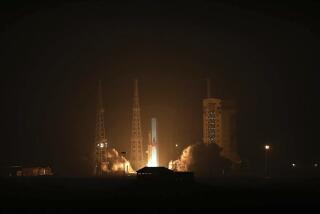Shuttle Crew Launches Satellite for Arab States
CAPE CANAVERAL, Fla. — With a Saudi Arabian prince looking on, Discovery’s international crew today launched a communications satellite whose transmissions for 22 Arab nations can be encoded to prevent any country from interfering with the spacecraft’s commands.
The Arabsat satellite was ejected from the ship’s cargo bay two hours after an inspection showed that a possible problem with one of its solar panels was a false alarm.
Prince Sultan ibn Salman al Saud, representing the Arab countries, watched from the flight deck as the satellite spun up on a turntable for stability and then was popped out of the bay by spring devices.
“It looked awfully good going away; it was on time. . . ,” astronaut John Fabian reported.
‘It Never Looked Better’
“It was a very, very good job,” the prince said. “It never looked better. . . . Thank you.”
After 45 minutes, a rocket on the satellite ignited and propelled Arabsat toward a stationary outpost 22,300 miles high.
Sultan is on the crew under a NASA policy that permits major shuttle users to send along observers. He will also photograph his homeland in a search for hidden oil, mineral and other resources.
Arabsat will serve as a space switchboard for telephone and data transmission and for regional and community television for participating Arab League countries. Signals can be encrypted to avoid political problems among the Arab user countries that could arise from the content of television programs or other transmissions.
Palestine on List
Participating nations are Algeria, Bahrain, Djibouti, Egypt, Iraq, Jordan, Kuwait, Lebanon, Libya, Mauritania, Morocco, Oman, Qatar, Saudi Arabia, Somalia, Sudan, Syria, Tunisia, United Arab Emirates, and North and South Yemen. The list also included Palestine.
An Arabsat map of the area to be served by the satellite includes Israel, formerly called Palestine before a Jewish homeland was established there.
Arabsat director Ali Mashat said the participating countries all are members of the Arab League, and “have a board of directors and . . . have a general assembly. Palestine is represented there as one of the members.” He said the league recognizes the Palestine Liberation Organization as the legal representative of Palestine, which he says is paying only two-tenths of 1% of the total cost of the satellite operation.
A sensor monitoring the Arabsat satellite had earlier indicated that a six-foot solar panel may have opened prematurely, making a launch impossible. Mission Control directed the astronauts to open a protective sun shield and take a close look at the payload with a television camera mounted on the end of the shuttle’s 50-foot robot arm.
Panel Firmly in Place
The TV picture relayed to the ground showed the solar panel clamped firmly in place.
The consortium of Arab nations is paying the National Aeronautics and Space Administration $11 million to launch Arabsat, the same price the Mexican government paid for Monday’s deployment of that country’s first communications satellite, Morelos-A.
That satellite was deployed eight hours after the space shuttle blazed away from the Cape Canaveral spaceport to begin a weeklong journey.
Forty-five minutes after Morelos was dropped off, a rocket fired it toward its duty station 22,300 miles above Earth.
More to Read
Sign up for Essential California
The most important California stories and recommendations in your inbox every morning.
You may occasionally receive promotional content from the Los Angeles Times.










